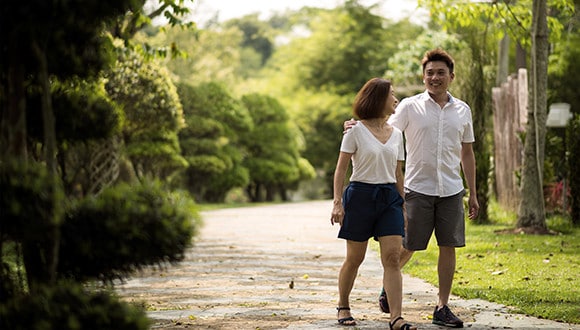How ‘green space’ can improve your health
Walking in the park, swimming in the ocean and chasing waterfalls can all boost your overall health.
Helen Hawkes
June 2019
If you’ve ever noticed how much happier and calmer you feel after a walk in the park or a hike in a rainforest, you may have accidentally discovered an effective way to boost your wellbeing.
While we may have suspected that time in ‘green space’ could improve our physical and mental health, an increasing number of studies are proving it.
British researchers who looked at data involving more than 290 million people found time spent in green space, defined as open, undeveloped land with natural vegetation as well as urban greenspaces, reduces the risk of type 2 diabetes, heart disease, premature death, preterm birth, stress and high blood pressure. While the researchers aren’t sure exactly why this is, they suggest it could be because of beneficial bacteria in nature as well as increased physical activity.
Given that humans have already spent more than 99.99% of their evolutionary history in natural environments, this isn’t so surprising, say Japanese researchers.
In 2010, they studied people spending time in forests and found that their level of the stress hormone cortisol decreased, as did their blood pressure and heart rate. The study renewed interest in the Japanese practice of ‘forest bathing’.
But you don’t need to find a forest to reap the rewards; evidence also suggests that living closer to urban green spaces, such as parks, is linked with lower mental distress, according to research published in the journal Psychological Science.

Green prescriptions
Some doctors are so convinced of the health benefits of fresh air that they’re giving ‘green prescriptions’ to their patients.
In the United States, there are at least 150 medical programs where doctors recommend regular visits to local parks for people with anxiety, obesity, depression or diabetes, according to the Global Wellness Summit’s 2019 Wellness Trends.
And some Scottish GPs are permitted to issue ‘nature prescriptions’ for conditions such as anxiety, depression and high blood pressure.
They are recommending patients take up gardening, go on coastal walks and immerse themselves in numerous other outdoor activities for their health and wellbeing.
How to get your dose of nature
Here are some simple ways to get some more green space into your life:
- Use a work or study break to visit a park, botanical garden, or just a café where you have a view of trees or another natural landscape.
- Bring nature into your home and office with plants. US space agency NASA first discovered their ability to clean up indoor air pollution in the 1980s, and further research says their presence may even improve your productivity at work.
- Use your smartphone for good. Your map app can guide you to green spaces you haven’t explored, and there are plenty of other apps that can help you become more connected to nature. For example, SkySafari can help you identify stars and QuestaGame helps you spot and identify animals.
- Gardening can improve your health, with multiple studies showing it reduces stress, may strengthen your immune system and even boost self-esteem.
- Creative activities such as sketching flowers or birds you see in nature, or simply finding a favourite green place where you can watch the sky, the trees or the ocean can leave you feeling calmer and more relaxed.
Related articles
CAN GARDENING REDUCE YOUR STRESS LEVELS?
Having a green thumb can benefit your mental and physical health.
7 WAYS TO GET OUT OF YOUR COMFORT ZONE THIS WEEK
Feel like you’re stuck in a rut? It might be time to break out of your routine.
WEEKEND REBOOT: STAYING HEALTHY IN YOUR DOWNTIME
Tips for less booze and more bounce on your weekends.
7 REASONS YOU SHOULD EXERCISE (THAT HAVE NOTHING TO DO WITH FITNESS)
Exercise doesn’t just keep you trim, it enhances your wellbeing from head to toe. Here’s how.